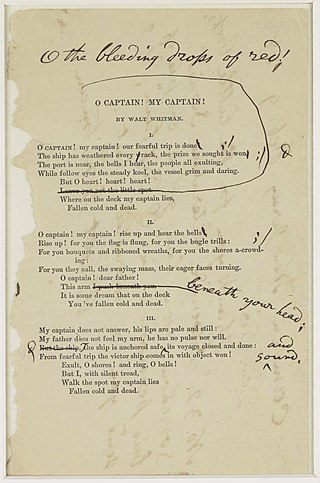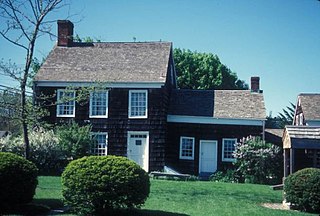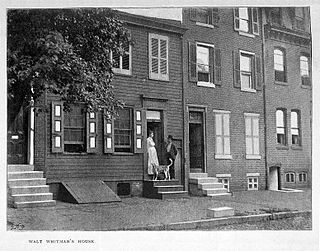
Walter Whitman Jr. was an American poet, essayist, and journalist. He is considered one of the most influential poets in American history. Whitman incorporated both transcendentalism and realism in his writings and is often called the father of free verse. His work was controversial in his time, particularly his 1855 poetry collection Leaves of Grass, which was described by some as obscene for its overt sensuality.

Piermont is a town in Grafton County, New Hampshire, United States. The population was 769 at the 2020 census. It is home to Camp Walt Whitman and Kingswood Camp for Boys.

Huntington Station is a hamlet and census-designated place (CDP) in the Town of Huntington in Suffolk County, on Long Island, in New York, in the United States. The population was reported as 34,878 with the 2020 census.

South Huntington is an affluent hamlet and census-designated place (CDP) within the Town of Huntington in Suffolk County, on Long Island, in New York, United States. The population was 9,422 at the 2010 census. Residents have a Huntington Station postal address.

The Delaware River Port Authority (DRPA), officially the Delaware River Port Authority of Pennsylvania and New Jersey, is a bi-state agency instrumentality created by a congressionally approved interstate compact between the state governments of Pennsylvania and New Jersey. The authority is principally charged to maintain and develop transportation links between the two states with four bridges and a mass transit rail line across the Delaware River. Though the DRPA has "port" in its name, it does not own or operate any ports.

John Burroughs was an American naturalist and nature essayist, active in the conservation movement in the United States. The first of his essay collections was Wake-Robin in 1871.
The Academy of American Poets is a national, member-supported organization that promotes poets and the art of poetry. The nonprofit organization was incorporated in the state of New York in 1934. It fosters the readership of poetry through outreach activities such as National Poetry Month, its website Poets.org, the syndicated series Poem-a-Day, American Poets magazine, readings and events, and poetry resources for K-12 educators. In addition, it sponsors a portfolio of nine major poetry awards, of which the first was a fellowship created in 1946 to support a poet and honor "distinguished achievement," and more than 200 prizes for student poets.

"O Captain! My Captain!" is an extended metaphor poem written by Walt Whitman in 1865 about the death of U.S. president Abraham Lincoln. Well received upon publication, the poem was Whitman's first to be anthologized and the most popular during his lifetime. Together with "When Lilacs Last in the Dooryard Bloom'd", "Hush'd Be the Camps To-day", and "This Dust was Once the Man", it is one of four poems written by Whitman about the death of Lincoln.

"When Lilacs Last in the Dooryard Bloom'd" is a long poem written by American poet Walt Whitman (1819–1892) as an elegy to President Abraham Lincoln. It was written in the summer of 1865 during a period of profound national mourning in the aftermath of the president's assassination on 14 April of that year.

Pfaff's was a drinking establishment in Manhattan, New York City, known for its literary and artistic clientele.
Walt Whitman High School is a four-year public secondary school located at 301 West Hills Road, in Huntington Station, New York. It is South Huntington Union Free School District's only high school, serving students in Huntington Station, South Huntington, Melville, and West Hills. The school typically has around 2,000 students in grades 9–12.

Walt Whitman Shops is a shopping mall in Huntington Station, New York in Suffolk County, New York on Long Island. As of 2022, the mall currently features Bloomingdale's, Macy's, and Saks Fifth Avenue. The mall currently features notable brands Lululemon, Brooks Brothers, Louis Vuitton, Vineyard Vines, Kate Spade New York, and Madewell.

The Walt Whitman Birthplace State Historic Site is a state historic site in West Hills, New York, listed on the National Register of Historic Places. The site preserves the birthplace of American poet Walt Whitman.

"Hush'd Be the Camps To-Day" is a poem by Walt Whitman dedicated to Abraham Lincoln. The poem was written on April 19, 1865, shortly after Lincoln's assassination. Whitman greatly admired Lincoln and went on to write additional poetry about him: "O Captain! My Captain!", "When Lilacs Last in the Dooryard Bloom'd", and "This Dust Was Once the Man." "Hush'd" is not particularly well known, and is generally considered to have been hastily written. Some critics highlight the poem as Whitman's first attempt to respond to Lincoln's death and emphasize that it would have drawn comparatively little attention if Whitman had not written his other poems on Lincoln.

The Walt Whitman House is a historic building in Camden, New Jersey, United States, which was the last residence of American poet Walt Whitman, in his declining years before his death. It is located at 330 Dr. Martin Luther King Jr. Boulevard, known as Mickle St. during Whitman's time there.

Revere House (1847–1912) was an upscale hotel in 19th-century Boston, Massachusetts, located on Bowdoin Square in the West End. Fire destroyed the building in 1912.

Camp Kabeyun is a summer camp for boys founded in 1924 by educator John Porter. It sits on 85 acres on the south end of Lake Winnipesaukee in Alton, New Hampshire. Kabeyun's program is designed to encourage boys' individual growth, self-awareness, and confidence in the context of community living. Boys at Kabeyun choose their own activities each morning and again at lunch. Activities include land and water sports, projects such as photography and leather working, and adventure trips, often in the White Mountains. Kabeyun has a high staff return rate and many counselors who are former campers. Former camper and counselor Josh Wolk wrote a memoir, Cabin Pressure, based on Kabeyun.

"This Dust Was Once the Man" is a brief elegy written by Walt Whitman in 1871. It was dedicated to Abraham Lincoln, the 16th president of the United States, whom Whitman greatly admired. The poem was written six years after Lincoln's assassination. Whitman had written three previous poems about Lincoln, all in 1865: "O Captain! My Captain!", "When Lilacs Last in the Dooryard Bloom'd", and "Hush'd Be the Camps To-Day".

The American poet Walt Whitman greatly admired Abraham Lincoln, the 16th president of the United States, and was deeply affected by his assassination, writing several poems as elegies and giving a series of lectures on Lincoln. The two never met. Shortly after Lincoln was killed in April 1865, Whitman hastily wrote the first of his Lincoln poems, "Hush'd Be the Camps To-Day". In the following months, he wrote two more: "O Captain! My Captain!" and "When Lilacs Last in the Dooryard Bloom'd". Both appeared in his collection Sequel to Drum-Taps later that year. The poems—particularly "My Captain!"—were well received and popular upon publication and, in the following years, Whitman styled himself as an interpreter of Lincoln. In 1871, his fourth poem on Lincoln, "This Dust Was Once the Man", was published, and the four were grouped together as the "President Lincoln's Burial Hymn" cluster in Passage to India. In 1881, the poems were republished in the "Memories of President Lincoln" cluster of Leaves of Grass.
















